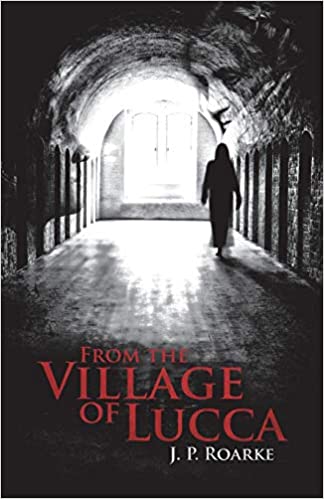UNWRAPPING THE SECRETS OF THE PAST
Writing a novel isn’t easy. Some authors spend years working on their manuscripts while for a lucky few the entire process might take a handful of months. Sadly, there is no magic formula for creating narratives that excite or sadden, or characters who are flawed, endearing, or somewhere in between. For what it’s worth the best advice is to write about what you know and let your imagination do the rest. J.P Roarke’s, From the Village of Lucca, is a good example of a book that embodies those principles.
Roarke, a Californian lawyer, has produced a gripping story with an ambitious structure that brilliantly exploits his knowledge of the legal world. The story opens with a prologue in which an elderly Italian/American thief plans a brutal crime, twenty-five years after pulling off “his greatest heist”. Joe Seppe may be old and absentminded, but he hasn’t lost his violent, spiteful streak and it’s that vindictiveness which brings about his death before he can put his hideous plan into effect. In an ideal world, he should have been snuffed out at the tail end of the 19th century before he could destroy the lives of a prominent Italian family in a village called Lucca. The family eventually moved to the United States for a new beginning, although tragedy would bring it to an end.
Spool forward to 1968 and Paul Rankin, a young attorney at his father’s legal firm in Arizona, is pulled off a case to work with elderly widow Louise Locke, who’s paying the company a huge retainer to find out what happened to her childhood friend Laura Spinali. Paul is incredulous as he thinks the case is a waste of time. Taking it on will also mean reconnecting with his father, from whom he’s estranged. Worse still the old man has Alzheimer’s Disease which means his memories of Louise & Laura are either fading, faded, or confused, casting doubts on his usefulness to any investigation. A further complication is Mrs. Locke herself. She isn’t the easiest person to get along with and she and Paul frequently clash, although their relationship does grow into something almost familial.
Endless questions underpin the story. Why is Louise obsessed with finding out what happened to Laura? How is a murder that happened in an Arizona whorehouse in the previous century, relevant to the case? Who enabled Laura’s disappearance? And why is a hospital for the mentally ill unwilling to release into the community the patients it’s supposedly helping? Roarke provides the answers with a strong, narrative driven by crisp, energetic writing. This is a novel that holds the attention with the power of its storytelling, the plausibility of its characters, a forensic attention to detail, and an unfailing moral position. Without giving too much away, Laura is found alive though not necessarily well, and the conditions in which she has been confined are worse than inhumane. Paul’s anger at the indignities inflicted on this misunderstood, vulnerable woman are visceral and we feel his rage while sharing his moments of helplessness. Roarke doesn’t overdo the polemics in much the same way that he doesn’t go OTT on the leitmotifs that run through the book. By using the first and third person in the narrative, multiple themes are revealed, leaving the reader with plenty to think about: What is this book really about? Is it about the power of fate to inflict wounds of lasting consequence? Is it about reconciliation, the desire to seek forgiveness through an act of atonement? Is it about forgiving the wrongs of the past to ensure a peaceful future? It is all of these and more, with the reader left to make up their own mind.
Laura and Louise may be elderly but they are also extraordinarily resilient. Suffering has made them strong while time has reinforced their belief in the value of standing up for what is right, regardless of the sacrifices that might entail. They are loyal, honourable, decent women, emblematic of how the good in the world can win out against wickedness, even when the odds of success aren’t necessarily great. And what about Paul, who through circumstances beyond his control, is denied a final reconciliation with his father? Peace comes later but only when he is older, wiser, better able to appreciate how much they had in common, and that although his father was strict, he only wanted what was best for his son. From the Village of Lucca is a novel which once read will never be forgotten. It is an engrossing, realistic, and complex book with a narrative that seamlessly moves between countries and centuries. Everything about it works (including the moving plot twist near the end), and I look forward to reading more novels of similar quality by this exciting, talented author.
Reviewed by Juliette Foster




